
Vyasa Puja Birthday Celebration of H.H. Satsvarupa dasa Goswami
The Veterans of Foreign Wars Hall, 845 Hudson Avenue, Stuyvesant Falls, New York 12173
There is plenty of parking near the Hall. The facility is just a few minutes’ walk from SDG’s home at 909 Albany Ave.
10:00 – 10:30 A.M. Kirtana
10:30 – 11:15 A.M. Presentation by Satsvarupa Maharaja
11:15 – 12:30 P.M. Book Table
12:30 – 1:15 P.M. Arati and kirtana
1:15 — 2:15 P.M. Prasadam Feast
Baladeva Vidyabhusana at [email protected] or (518) 754-1108
Krsna dasi at [email protected] or (518) 822-7636
“I request as many devotees as possible to attend so we can feel the family spirit strongly. I become very satisfied when we are all gathered together.”
******
“In the association of pure devotees, discussion of the pastimes and activities of the Supreme Personality of Godhead is very pleasing and satisfying to the ear and the heart. By cultivating such knowledge one gradually becomes advanced on the path of liberation, and thereafter he is freed, and his attraction becomes fixed. Then real devotion and devotional service begin.”
“The process of advancing in Kṛṣṇa consciousness and devotional service is described here. The first point is that one must seek the association of persons who are Kṛṣṇa conscious and who engage in devotional service. Without such association one cannot make advancement. Simply by theoretical knowledge or study one cannot make any appreciable advancement. One must give up the association of materialistic persons and seek the association of devotees because without the association of devotees one cannot understand the activities of the Lord….. One who has firm faith in the Supreme Personality of Godhead becomes fixed, and his attraction for association with the Lord and the devotees increases. Association with devotees means association with the Lord. The devotee who makes this association develops the consciousness for rendering service to the Lord, and then, being situated in the transcendental position of devotional service, he gradually becomes perfect.”
— Srimad-Bhagavatam 3.25.25, verse and purport
Satsvarupa Maharaja has been very stressed out this week as the day for taping the podcast for his “Late Morning Show” with Namarasa approaches. His Parkinson’s is extremely piqued, manifesting in disorientation, obsession, wild communications, headaches, etc. It’s all new territory for me, so I can’t make any predictions about how things will normalize next week when the podcast is over. Be sure to tune in next week.
PS On another note, today SDG had a barnacle in his ear removed by a biopsy by a dermatologist.
Hari Hari,
Baladeva
We need to expand our team of proofreaders as we aim to increase the rate of republication of Satsvarūpa Mahārāja’s books as well as new books that he writes.
This includes a need for fluent bilingual Spanish and English speakers to proofread Spanish translations (we currently have around 20 Spanish translations waiting to be proofread).
Anyone interested in this particular service should contact Manohara dāsa at [email protected]
If you would like to help, please contact Kṛṣṇa-bhajana dāsa at [email protected] or [email protected] and we will find you a service that utilizes your talents.
Manu said yesterday he didn’t get heavy with himself. Yes, I too just chant “with abandon,” grateful even for the mechanical act. I don’t get heavy because it’s all I can do. I hope to improve. Don’t kick and berate yourself. Yet you want to say . . . “Hey, rickshaw driver, don’t go where you want, but where I tell you!” Dear mind, take us to that chanting. Pay attention as you almost effortlessly utter divine names. Try to realize what it is—this is the nectar for which we are always anxious.
******
Don’t worry about eating and sleeping and attacks to your body. In any case, you are doing the best thing a person can do, you are chanting. An infant in paradise. He can’t appreciate it fully or even much. We play on the shore of the nectar ocean. We dive in the waves. We are neophytes in Heaven. Goloka comes to us in holy names.
******
That’s me chanting.
That’s you chanting.
That’s the way in this age
Haribol.
It’s all the rage.
Morning walk
Sri-krsna-caitanya prabhu nityananda sri-advaita gadadhara srivasadi gaura-bhakti-vrnda.
******
Hare Krsna. April 15, 1995, a morning walk in Scotland where we are for a week of sixty-four rounds daily, four of us. Not much time to do any writing or talking. I don’t know why I’m talking now, but I’m trying to keep focused on a day that’s here and not worry about the future. There’s so many things I could worry about; it would just overwhelm me. So just take this day as it is, as offered by Krsna in Krsna consciousness. I may develop some twinge in my eye and not be able to chant my rounds today—that could happen.
******
Walking on toward the cottage, it’s called Mark Cottage. I’ll mark it as a place to try to improve my chanting, not just for a week but continued better chanting, aware of individual mantras, of their syllables, how I utter them, how they come out, how I breathe in between mantras—just getting a better apprehension of my own external habit and trying to make it better. Faster, too.
******
After only one day of doing sixty-four, it would be nice to always do some increased form over the sixteen, but I don’t know if I can. Hare Krsna Hare Krsna, Krsna Krsna Hare Hare.
******
Concentrate on the day that’s here and the little things or real things that touch you, that ought to touch you within the day. Nature. Just now I bent down and saw little stones, the crusted mud, brown and green, road and meadow. Yeah, and the sheep. It’s not our fault if we like to find pleasant things in the day, things that help our Krsna consciousness and avoid that which is not pleasant, just like we avoid the demons. Or, if we have to face it, we try to see Krsna there, because the maha-mantra can remove misery. It doesn’t mean it removes a headache or a backache, but you don’t dwell on the misery of that material condition, and you turn to Krsna. And of course, the maha-mantra removes the misery in the sense that if you achieve perfection, you won’t have to come back again into this material world. Just this one way, chanting Krsna Krsna, can give you perfection. You don’t need to know so many details or many names of God. Just chant with devotion the mantra your spiritual master has given you. And do other service too. Hare Krsna Hare Krsna, Krsna Krsna Hare Hare/ Hare Rama Hare Rama, Rama Rama Hare Hare. Prabhupada, what do you want me to do? My dear Lord Krsna, how do You want me to serve You? I’m doing what I can now according to my inclination.
pp. 18-30
Sitting reverently
in my master’s room,
I stretch out my legs.
—
Thinking what was it like
when he was here.
A frog jumps through the lattice.
—
The window view—
devotees walk
past Rupa’s kutir.
—
Locking the room,
taking the dust
of the Vaishnavas.
—
“When shall I become fortunate to visit Mathura-puri and shed tears of bliss as I drink from the stream of nectar flowing from the mouths of the old guides there who say, ‘Here was Nanda Maharaja’s home. Here the cart was broken. Here Lord Damodar, who breaks the bonds of birth and death for His devotees, was Himself tied with ropes by mother Yashoda. Here by the Yamuna River Krishna killed the Keshi demon’ ? ”
—Sri Kavisekhara
—
Talking loudly
an oarsman
plies through the Yamuna.
—
In the river,
rumors of turtles.
—
A man chasing a horse
catches up to him
at Keshi-ghat.*
—
His hair in matted locks,
an ascetic
throws seeds to the pigeonns.
—
Shawl over his head,
a devotee of Hanuman
sits at the shrine.
—
At the Keshi-ghat,
a vicious dogfight,
aftergrowls.
—
“Go ahead and worship Lord Brahma! Go ahead and wor¬ship Lord Shiva! Go ahead and worship the Supreme Brahman! I shall not follow you. I shall simply worship the Vrindaban forest, which brought transcendental delight to Lord Krishna.”
—from the Padyavali, compiled by.
Rupa Goswami; author unknown
—
This forest crane
like Bakasura,*
sighing and grunting.
—
Alone in the woods
the parrots predominate.
—
Wandering
into Vrindaban forest—
two mongrels.
—
Leaving the forest,
the secret’s secure.
—
Narottam das Thakur was a Bengali -Vaishnava poet who lived in the late sixteenth century. He wrote in simple Bengali, but his songs are as authoritative as the Vedas themselves. His Deity of Krishna is installed in the Radha-Gokulananda temple, where Narottam’s body is entombed.
“When will that opportune moment come to us when there will be shivering of the body as ‘soon as we chant Lord Chaitanya’s name? While chanting Hare Krishna, when will there be tears in the eyes?”
—from “Longings,” by Narottam das Thakur
—
Into this silent yard,
bells ffom a second temple,
drums from a third.
—
Up all night temple-visiting,
he brings me water
from Radha’s pond.
—
Before the poet’s tomb,
cool thoughts
under a half moon.
—
Narottam prays,
“0 Moon of Gokula,*
let my appeal touch Your ears.”
*Krishna. °
pp. 536-38
In the writing of this diary chapter, one can gradually see how I worked through the external culture shock of Vrndavana to a softened view, and then finally a more reverential appreciation of the mysticism. Although it may not seem so to the reader, everything that I wrote at this time was a preparation for the descriptions of Srila Prabhupada in Vrndavana which appear in Volume One of the Srila Prabhupada-lilamrta. Prabhupada is not directly described in this diary chapter—he is elusive to me—partly because of my own false ego, but also because he cannot be easily attained except by pure devotion. And besides, these were just impromptu notes written down while the more serious literary work of gathering interviews and writing the versions of the biography chapters that we now have in Srila Prabhupada-lilamrta was going on.
Readers of Srila Prabhupada-lilamrta may take for granted events such as the date Prabhupada moved from Delhi to Vrndavana, when he moved to the Vamsi-Gopala temple, when he moved from there to the Radha-Damodara temple, what time the first volume of Srimad-Bhagavatam was published, and then the second, when he was in Delhi, and so on, but all those things were not known to us at this time. It was like detective work, and it was very exciting as gradually, bits of information came in. It wasn’t that everything came directly from the interviews either. We had to cross-check the different persons we interviewed and guess their motives as to why they said certain things. Often, for example, Indian gentlemen that we met said, “I was the one who told Swamiji to go to the West,” or “I gave him the money to go to the West.” We had to decipher from people’s self-praise what was the actual truth of their connection to Prabhupada.
While this was being written, the book distribution “warfare” was reaching a high intensity, especially in American airports. Deceptive lines and techniques were being exposed by television and newspapers. I was feeling twinges of conscience about this, even while in Vrndavana. Although I myself was not one of the book distributors, we all felt the results of being accused as flim-flam artists. This impression of the Hare Krsna members gradually and deeply took hold among the American public. There is no point trying with hindsight to justify my feelings of criticism toward some of the dubious book distribution techniques, but the diary records some of the naked feelings of unrest and guilt, fear and helplessness to change it—and worry at what would become of our movement if this continued. Even while in Vrndavana, you worry about other things.
Our whole research team went to India in September of 1979 and we divided up the land as follows: Kundali went to Calcutta; Sesa to Bombay; Baladeva to Vrndavana and Delhi; and I was given the assignment of Jhansi. Most of our initial contacts were names that we had picked up from Prabhupada’s early correspondence, which sometimes led to dead ends. It often took a lot of diligent work to track down our sources, and there was always the “India factor” to deal with in terms of travel and the normal austerities for Westerners in India. When I went to Jhansi, I was received cordially by some of the persons Prabhupada formerly knew there, although on one occasion I was served meat and had to politely refuse it. I also met with some of the ladies of the social club who had originally put pressure on Prabhupada to move out of the Radha-Krsna temple in Jhansi and I was surprised to find that they still held the same opinion—that their work was more important than Prabhupada’s.
Everyone who met Prabhupada certainly had respect for him, although some were surprised at how such a humble person had gone on to do such tremendous work in building a world religion. It was an almost universal response from those who had met Prabhupada that he was a great preacher of Bhagavad-gita, which they usually knew by attending some classes he had held in their area. This, of course, was not limited just to those who knew him after he had become a sannyasi, but as far back as we found people, they all said he was a preacher of Krsna consciousness
Plane’s flying to Delhi. Going with four men to research. That means trying to find the order of events in Srila Prabhupada’s life.
Head groggy from sitting in my plane seat, passing out unconscious, having snatches of dreams, sleeping sitting up in the chair. In one dream I signalled to a man in the street. He came up and I thought, “I will preach to him.” But it was difficult because, I thought, “I have been so long out of practice.” I asked him, “Do you believe in God?” He replied, yes. I wanted to ask him something further, but my mouth couldn’t form the words. He looked at me, “Oh,” as if I were retarded. I struggled to speak but could only repeat my first question, “Do you believe in God?” He started to walk away. I was ineffective.
Waking, my head against the window, my eyes carefully avoiding the sex and violence on the in-flight movie, I thought, “Why this dream where I could not preach?”
I turned impetuously to thoughts of the biography research ahead in Vrndavana: “What is this research? Why are you doing it?” I thought critically—how do you know Prabhupada wants you poking after these facts in his life? Is it really important to do this? Think of the other bold preachers!
Despite the criticism, I’m fixed. Writing his biography is important. We should not, however, put forward things in his life that appear mundane or make him look mundane. The presentation and selection are very important.
Certainly I must select many more facts, and thus the reason for our journey to Vrndavana, five of us.
Mortal flesh, life temporarily kept within the vessel of this body. At any moment, by jarring or poking, the life can run out. Then by karma, another birth in another vessel—some of them horrible, stunted lives, all of them suffering. Ignorance brings sin brings reaction. This science I know.
Serve Krsna for His happiness. Don’t even pursue your liberation. Just aspire that He always keep you, life after life, as the servant of His servant.
But the mortal anxiety: when it comes, will I pass the test? Will I think of Krsna and pass over to the side of freedom?
Engaged constantly in chanting and hearing about Me, the Supreme Personality of Godhead, the sadhus do not suffer from material miseries because they are always filled with thoughts of My pastimes and activities.
—Bhag. 3.25.23
pp. 65-68
We know what it means to be respectful to an officer or superior, but to be like that with someone at all times and in all situations is rare. In fact, it should be reserved for the guru.
Although you are an individual with free will, you allow Prabhupada to tell you what to do and to define reality—to tell you when you are right or wrong. In his presence you feel more peace than you do with any other person, but in a certain sense you never relax with him. You never think that his presence is ordinary. In addition to respect, you always feel expectation. The relationship was always one of servant to master, but at the same time it was filled with personal emotion; you desire more than anything that he reciprocate with you.
On Srila Prabhupada’s first visit to Dallas, an incident occurred that brings out some of these themes. Prabhupada arrived at the temple, gave a short lecture from the vyasasana, and bowed before the altar painting of Panca-tattva. He then walked into the small courtyard between the two buildings, on his way to his room. Noticing the trunk of a big tree, he asked, “What is this?” I replied that it was the remains of a tree which had recently blown over during a windstorm. One of the devotees told Prabhupada, “It’s dead.” Prabhupada said, “It’s not dead. Look!” He pointed to a small green twig growing out from the trunk.
As soon as Prabhupada stopped to look at this tree, a crowd of devotees and children gathered around him, watching his every expression. Prabhupada’s eyes showed anger, and his voice too. “Why have you done this?” he asked me, since I was the Temple President. I tried to explain that the wind had blown the tree over and it remained leaning on the building in a dangerous condition.
“No,” Prabhupada said. “You should not have done it. It would have been all right to leave it.” I immediately accepted that I had made a mistake, but at the same time I couldn’t conceive how I could have avoided cutting down the tree. It was a large tree, and after it had fallen over, it was leaning heavily against the building. At first I hadn’t tried to cut the tree, but devotees had approached me with their concern. They said, “This is very dangerous. The children eat in the room where the tree is leaning. It might collapse the whole wall and someone will be hurt.” They convinced me, and so several men with power saws climbed up the tree, and after several days of work they dismantled it branch by branch. But Prabhupada said that it was an act of unnecessary violence.
I don’t mind going down in history as being de-moniac for cutting that tree, since that’s how Prabhupada saw it. I liked the idea that Prabhupada said it should not be cut down. Now I can quote his statement in similar instances. We should make all efforts to spare trees and not cut them down whimsically just to suit our needs. I want to rectify for that act of unnecessary violence to the tree in Dallas. It doesn’t seem to matter now whether the tree really had to be cut down. The external situation is not as important as the instruction that Prabhupada wanted to give. And in order to receive that instruction a disciple has to be respectful.
If you were respectful, you absorbed whatever reprimand he gave you. Later you could ask him more about the implications of your mistake. After the reprimand for the tree in Dallas, I approached Prabhupada in a quieter mood, when he was alone.
I asked, “The cutting down of that tree—was that an offense?”
Prabhupada replied, “It was not offensive. It was ignorance.”
Sometimes when guests would ask Prabhupada questions, they would think that he did not address their inquiry. But Prabhupada’s followers would tell them, “Listen to what Prabhupada said. He answered a more important question for you. Try to hear him. Prabhupada’s answers can get you out of all maya.”
If the person was a challenger, he would stick to the external situation: “He did not answer what I said.” It was not improper to repeat or rephrase a question to make sure Prabhupada understood it, but ultimately, Prabhupada had his own reasons why he did or did not address certain issues.
Prabhupada’s disciples all felt a lot of affection for him, but they always expressed it through respectful behavior. We hardly ever dared to give our opinions. But sometimes while serving Prabhupada as secretary, it was your service to be sure that Prabhupada knew exactly what you were saying, and that you also understood him precisely. This put a strain on the formal relationship of respect, but it rarely impaired it.
I would say, “Prabhupada, here’s a letter from the GBC man for Africa. He wants to know what he should do in a particular case.” If Prabhupada’s reply did not exactly address what you were saying, you couldn’t be shy and let it go. The GBC man of Africa was waiting for Prabhupada’s reply, and he wanted to know exactly what to do. He also expected that his point of view had been made very clear to Srila Prabhupada. Although I was timid, I had to restate the person’s questions and clarify them until I was satisfied that Prabhupada knew their precise points. If Prabhupada did not seem to respond to their actual point, I would say, “But Prabhupada, what he’s saying is . . . “—until I was sure that Prabhupada had focused on what the person was saying and that the person would be satisfied that Prabhupada had heard it. That was not always easy, but it was part of your work, and Prabhupada did not think it was offensive to press him. Still, he reserved the right to end the discussion when he was satisfied.
pp. 1-9
Text 28
ete cāṁśa-kalāḥ puṁsaḥ
kṛṣṇas tu bhagavān svayam
indrāri-vyākulaṁ lokaṁ
mṛḍayanti yuge yugeAll of the above-mentioned incarnations are either plenary portions or portions of the plenary portions of the Lord, but Lord Sri Krsna is the original Personality of Godhead. All of them appear on planets whenever there is a disturbance created by the atheists. The Lord incarnates to protect the theists.
Prabhupada mentions that Krsna’s sixty-four qualities (as they are listed in The Nectar of Devotion) are qualities that other incarnations, and even ordinary living beings, can display to some small degree. A most perfected jiva like Lord Brahma can show seventy-eight percent of Krsna’s qualities, although those can be manifested only in part. Even fully empowered Visnu incarnations do not possess four of the qualities which are present in Vraja Krsna alone.
Krsnadasa Kaviraja also discusses this mahavakya verse in the second chapter of the Caitanya-caritamrta.
There, he proves that Krsna is the Supreme form of Bhagavan. Then he establishes that Sri Krsna is nondifferent from Lord Caitanya:
“The Bhagavatam describes the symptoms and deeds of the incarnations in general and counts Sri Krsna among them. ‘This made Suta Gosvami greatly apprehensive. Therefore he distinguished each incarnation by its specific symptoms.” (Cc. Adi 2.68-69) After giving the list, Suta Gosvami made it perfectly clear that although Krsna appears as a member on the list, He is actually the source of all the avataras and all the qualities that ‘They have displayed.
The dictionary defines Krsna as one of the important and popular incarnations of Visnu. Therefore, it is crucial to understand the message of text 28. As Srila Prabhupada comments, “This statement of Srimad-Bhagavatam (1.3.28) definitely negates the concept that Sri Krsna is an avatara of Visnu or Narayana. Lord Sri Krsna is the original Personality of Godhead, the supreme cause of all causes.” (Cc. Adi 2.67, purport) Krsnadasa Kaviraja Gosvami analyzes the grammatical construction of this Srimad-Bhagavatam verse and proves that it would be fallacious to assume that Krsna is one of the many incarnations listed. “An interpretation is never accepted as evidence if it opposes the principles of scripture.” (Cc. Adi 2.73) Since so many scriptural statements refer to Krsna as the original Personality of Godhead, it is unwise to interpret other scriptural statements otherwise.
First Krsna is mentioned, and then His identity as the Supreme Personality of Godhead is explained. “Had Krsna been the plenary portion and Narayana the primeval Lord, the statement of Suta Gosvami would have been reversed. Thus he would have said: `Narayana, the source of all incarnations, is the original Personality of Godhead. He has appeared as Sri Krsna.'” (Cc. Adi 2.84-85) Since there cannot be mistakes in the composition of scripture, there is no mistake in this statement.
I am happy to be here—or anywhere—writing on Bhagavatam. All I have just put here on the maha-vakya verse is a little gloss on an important topic. Most of us don’t find it necessary to keep bringing this verse to the forefront of our devotional service. Most of us have already accepted the arguments and Krsna as the Supreme Lord. We prefer to discuss Krsna’s pastimes among like-minded devotees. We want to serve Lord Krsna, chant His holy names, see His Deity form, and perform devotional activities. Because we need to preach, however, we need to understand these arguments.
What was I going to say? I was going to repeat, “Krsnas tu bhagavan svayam.” I was saying that I’m glad to be here, up early, commencing a new volume of A Poor Man Reads the Bhagavatam.
I would like to go and sit in Prabhupada’s rooms on the fifth floor of this tower, to sit before his full-sized murti. I sat there while writing the Bombay poems in Remembering Srila Prabhupada. Sitting there helps me to focus on asking Prabhupada’s permission and blessings to write. To get into that room, however, I have to find the person with the key and figure out when I can be there when no one else is there. It’s a ritual in a way, to go before him and ask his permission, because I have Prabhupada sitting right here with me in this room. I ask my murti to please tolerate the fact that yesterday I was unable to bathe him or change his clothes. It was such an unusual day, with thirteen hours of car travel over bad roads. God, it was a hard haul, and I was so relieved to arrive. I did offer Prabhupada the Ekadasi lunch that someone cooked.
Krsnas to bhagavan svayam. We can develop some of Sri Krsna’s qualities. He’s the one Supreme Lord. When we see Rama, we can think, “Dear Lord Krsna, what a powerful and attractive form You have taken as Lord Rama.” Sri Krsna is our ista-devata.
What relief! While traveling yesterday I dictated letters above the noise and rattle of the car, but I was feeling, “Dear Correspondent, it’s so hard to say something worthwhile. Please read my books. They are a more complete letter to you. I empathize with the fact that you want the best education for your growing children, I appreciate that you have to research the world’s gurukulas, and that you may have to uproot yourself if the children are going to attend your choice of school, but how can I be expected to make such decisions for you? How can I decide whether a brahmacari should go on serving in Sicily or move to Mayapur? Better you read my books to better understand what I can give you.”
And in “my books,” what is there except a spark of Prabhupada’s books? What have I to add to krsnas tu bhagavan svayam? I have flowers at his feet.
Skinny Merink and his even skinnier
friend, tanned and arrived from
somewhere vague in India on narrow
roads to show up at big front
door of ISKCON Mumbai and
krsnas tu bhagavan svayam.
We are going through the Srimad-Bhagavatam. We are opening a bottle shop specializing in mahavakya verses. We are putting the (non-alcoholic) wine in new bottles.
“Yes, we have no bananas,
we have no bananas today”—
another 1940s song. I
mention it here because
the spirit is in me, in
black ink.
I’ll get through. Past
that jackhammer,
I’ll get through.
You’ll see.
I’ll reach Goloka Vrndavana.
I’m sure.
pp. 10-13
Dear Gita Nagari Farm,
You are a charming place, a rural farm located in the heart of Pennsylvania. You have been operating in ISKCON for about fifty years. You were purchased in 1975, while Srila Prabhupada was still alive. He visited you one day and expressed plans for how to develop your land, essentially a farm which mainly grows corn, a crop for the cows. Devotees also produce wheat, Sudan-grass hay, sunflowers, vegetables for the Deities, etc. from your soil.
You originally had two tall silos for storing the corn during the winter. Only one is remaining, but you now have three smaller silos for wheat and other grains, Your 350 acres exist on fertile land, and some trees provide wood for heating, while others are sources for maple syrup. Srila Prabhupada planned for you in his mind before the land was even born or purchased. He described you as a community where devotees would live together, where agriculture would be pursued and especially cows milked and cared for. Cows would be protected. They would never be killed.
Most of the approximately 95 cows and oxen living on your land are of the Brown Swiss variety because they can withstand cold temperatures, and your dairy churns out karma-free milk products such as hard cheese, yogurt, and paneer. Gradually, devotees have bought farm implements for use on your land such as hay trucks and trailers, forklifts, augers, tractors, a refrigerated truck, and many machines to facilitate milk production. You have even developed a wide variety of hiking paths to explore, complete with maps and markers.
You were my base camp for approximately ten years. It was there I wrote the Prabhupada-ililamrta with a team of assistants. Gita Nagari Press was born there. It took our Gita Nagari Press team five years to finish the authorized seven-volume biography of Srila Prabhupada. Gita Nagari, you provided me all facilities to finish the biography, such as a community of devotees, a cabin by the Tuscarora Creek, and a peaceful, quiet setting to write in. Your cabin provided a nice place for getting up at midnight.
The Lilamrta was finished by 1983 and sold widely throughout ISKCON.
******
Dear Tuscarora Creek,
You were a narrow creek off the back side of the house where I lived at Gita Nagari; you went down in dry season and up in rainy season. Ducks sometimes swam there. To see you flowing was a very charming sight. Sometimes my disciple Narayana Kavaca would row me in a rowboat, and once he capsized in your waters, and he jumped out of the canoe just to save me from getting wet.
One time I had a migraine headache that lasted for two days, and I had to endure it, lying in bed on your bank and taking as much medicine as I could bear. Finally, it went away. This was during the time when my close friend Yadunandana Maharaja was visiting me for two weeks. He was writing articles, and I was riding out my pain.
******
Dear Sheaffer fountain pens,
I have used many of you over the years. I appreciated how you enabled me to write swiftly in composing my books throughout the 1980s and 1990s. I was at the height of my creative spirit in composing books about Krsna, Prabhupada and the Krsna consciousness movement. Although I received many pens, some of them more expensive than Sheaffers, I considered you my favorite pen. You wrote so smoothly and with great speed, without drying up like some of the others.
Dear Sheaffer, you did have a defect which led me to give you up after approximately twenty years of good service: you leaked! I was always getting complaints about the ink stains on my hands, clothes, and books.
I’m grateful for all the literature we created together over the years.
There are now “rollerball” pens which do the job without leaking. But I will always remember the feel of a good fountain pen like you, especially during my free-writing days.
Fondly,
Satsvarupa dasa Goswami
******
Dear gremlins,
You have plagued me for most of my writing life (50-60 years). In a textbook on writing, a gremlin is described as a negative, pessimistic thought that comes to a would-be writer and destroys his creative thoughts. You are technically a writer’s block of some sort or another. You tell the writer mentally, “That’s not right,” “You don’t know how to write,” etc. You are enemies of creative flow.
Books giving advice on writing render service by telling us how to avoid you when we write. One should not listen to you. One should be positive-minded and write where the flow goes, in a creative spirit. You are a destroyer of Krsna’s gift that allows us to write freely from the heart. So, the expert advice is: “Don’t listen to the gremlins that plague you and threaten your creative spirit.” Krsna is always willing to help a sincere artist in coming in contact with Him. But you have to do something too: you have to pray; you have to try with determination and hard work. Ultimately, it is not so hard to stop the destructive voice of you gremlins. Just think positively and tune in to Krsna’s positive voice. For a devotee-artist, this is a very important exchange with the Creator in our personal service to Him.
Dear devotee-writers, write freely! Destroy the gremlin! You can do this. You have to have faith in your service.
******
Dear Geaglum,
As a sannyasi, I traveled with a group of men not just within America, but often to Ireland and Europe. I and my men stayed five years consecutively in Ireland. I used Ireland as a base for writing and painting.
You are a peninsula off the island of Govindadvipa, the island where the main temple of Inis Rath was located, and where Radha-Govinda Deities reside. I preferred to stay in Geaglum. There were several householders who also lived in small buildings there. I used to tease them and divide the word Geaglum into “gay” and “glum,” indicating that the place was both happy and glum. That was their attitude toward Ireland also. The householder disciple who took most care of me on Geaglum was Manu dasa. He divided half of his small house and let me stay there in comfort. He also built me a small shed in the beautiful field overlooking the quay. It was very peaceful and conducive to writing. Many books were written there.
pp. 167-171
In Srimad-Bhagavatam 4.30.19, Maitreya says one can live in family life and not be contaminated. Srila Prabhupada expands on this and says the third chapter of Bhagavad-gita describes how material acts in the service of Lord Krsna becomes sources of liberation. How the same activity can be the cause of bondage and liberation”—is explained in the example of milk which in one form causes indigestion, and as yogurt cures the malady. I thought my writing’s like this. I am now using it in Lord Krsna’s service. I hope He accepts it. If He sees it as bad for me, as a material impediment, He will take it away. That is certainly in His power. The Lord gives and He takes away. He is Lord Hari with ten hands; no one can stop His giving or taking.
Srila Prabhupada assures us (Bhag. 4.30.22, purport) that Lord Krsna will be inclined to reveal Himself to us as we engage in the process of devotional service. It’s al¬ready settled how to find God or make spiritual progress. You don’t have to research to find a new way. (Although it may be new to you. And it’s also new in the sense of ever-fresh non-hackneyed).
The way is devotional service. “Simply by chanting the holy names of the Lord, one can without a doubt be¬come spiritually advanced.”
The Supreme Lord is in all hearts, the witness of all our activities. “The Supreme Lord gives us the facility to act in the way we wish.” I pray He my see in me my desires to be His pure devotee. I am emphasizing that I serve Him by writing, and I think He is encouraging me. But I pray He will see my desire is to serve Him, not that my first desire is to enjoy the powers and joys and writing as something apart from Him or for my own betterment. Let me serve Him.
Let Him see some spark in me and give me facility for that—pure devotional service unto guru and Lord Krsna.
For my “Travel Diary,”
I polished off another poetry book,
the New Orleans one and put it in
the garbage bag attached to my desk.
Going through the one by Vietnam vet
isn’t so quick. He nails it down,
what he’s been through,
that hell.
My hour in the van to make a few
lines, count myself lucky,
make my written obeisances.
Don’t be influenced directly, don’t
take their excrement and blasphemy on
your head.
I’d like to read the Bhagavad-gita,
I tell myself helplessly.
Anyway, I’m reading Bhagavatam.
Started a new series of poems
to Prabhupada, but they don’t make
these redundant.
These are to get free, to do
something accountable. Sri
Krsna and my master, hear them
while you eat. Pray to them
while you talk.
I can just ride along on what my
master says and in future recall it
when I give a temple lecture.
Lord Krsna is all-attractive, best
name for God.
Unless He attracts everyone, how can He be
God? There must be an original cause and
He’s a person. We hear from authority.
Now I hear Prabhupada in Stockholm.
I’m not a pilgrim in the clouds.
“The Henry James of ISKCON,”
quipped my brother.
Me a helpless writer for the cause.
Don’t say I’m unhinged, crazy,
me talking up to Schuemacher and others—
yeah, you could accuse me of it,
I guess.
Inveterate pose. Get out the dictionary
and look up inveterate.
Get out of bed at midnight and
put wet tissue on the eyes and celebrate
a plain one-hour writing session and a
40 minute beautiful reading of
Srimad-Bhagavatam.
Then japa by candlelight.
Those 3 hours are the cream of 24. But here too,
dear master, I am controlling
myself. I am your man. Pray my
Hare Krsnas, get ready to travel.
I’m not a pilgrim of the clouds,
I’m a pilgrim to Krsnaloka, to
back to Godhead under direction of my guru.
I am on the map, yasya prasada.
Got my name, got stories of my master,
got teeth and tongue for awhile to
tell it—and I can move an audience to
smiles or thoughtfulness—or sleep.
Lord Krsna is Supreme. I approach the books.
I’ll gain in stamina. Jara won’t
get me. No, I really can’t say—it’s all up
to Him. Dear Lord, You are the
controller. You give us what we want—
I want to serve You—all in impurity
cleared away from my mind,
blessed forgetfulness
of the past, dreams of Thee and
practical service,
Just like a dedicated daring
Red Cross worker or
even front-line soldier, or silent long-
tolling satisfied servant. Give me some
mercy like that.
pp. 50-53
This morning was the darkest morning yet, mostly because it was so overcast. When you walk in the dark, you notice whatever light is there. The big, fat milkweed blossoms looked like snowballs, and the cows lying down in the pastures looked like big white mounds. Some of the roofs were reflecting light from somewhere. At the end of the road, I saw the yellow light in the schoolhouse where Prabhupada dasa is up and chanting.
Even the animals felt morning coming on. As I passed a herd of cows, one got up slowly, first on two legs and then, on four. Then another did the same, both of them snorting. The wind was audible, and light rain tinkled on me. I had nothing to do but chant on my beads as clearly and attentively as possible while I walked. I knew that I wouldn’t be able to pay complete attention, but I also knew that Lord Krsna would appreciate my attempt. That is my saving grace.
About fifteen minutes after I started out, I began to notice more light. My beadbag is light-colored, and if an oncoming car were to see me, I think the first thing he would notice is the light-colored bag. But I was noticing the little white blossoms on the raspberry bushes as I walked past them. And puddles of water on the tarmac road minoring the sky.
More sincere questions asked of me.
Many questions are, of course, analytical. The devotee sees that he’s not chanting as well as he should be, and he has a pretty good idea why that’s so. He says, “I rationalize,” or, “I’m complacent,” or, “I’m trying to avoid my responsibility.” What more can I add if he has already analyzed his own devious mind and the reluctance of his conditioned soul? If I am to help, I feel like a coach on the sidelines, occasionally clapping my hands and calling out a cheerful remark.
When devotees reveal their own cheating nature, they don’t want me to take further advantage of their vulnerability. They do want me to pummel that foolish kind of rationalization that will make us think we can’t or don’t want to improve our japa. One devotee said, “I should ardently desire to develop the urge to be truthful to my goal of pure devotional service, but I rationalize that chanting my rounds inattentively is at least better than not chanting them at all.”
This kind of downward logic will not get us anywhere. It’s the same logic by which devotees ask what they can get away with. Can they drink carbonated soda? Can they buy bread from the stores when they are on traveling sankirtana? What can we get away with?
We really should be asking what we can do to attain perfection. Perfection isn’t like a cherry on the cake—something we can do without. It’s our whole purpose and goal in life. Or don’t call it perfection then. Let’s just call it “striving to get beyond offensive chanting.” Or call it “making any progress at all.” Our lives have to be aimed toward improvement. Perfection doesn’t necessarily mean being perfect; it means perfecting or improving. Therefore, we always have to work in favor of the goal of love of God and not rationalize our way to a lesser goal. What kind of logic is it that makes us say, “At least I’m chanting, so I shouldn’t complain that it’s inattentive”?
Some questions are just too big for me, like “How can I be humble?” or, “How can we avoid offending devotees?” Of course, these are deep considerations, but something in me doubts the seriousness of having a question-and-answer exchange on such profundities. Do the devotees really expect me to give a quick response about things like that? Will they listen to what I say and be able to get a handle on it? From what level will I speak? Will I reach into my mental collection of “Famous Transcendental Quotations?” I’m afraid I’ll resort to truisms. To be humble, we should avoid pride. In order to avoid finding fault with devotees, we should realize that devotees are exalted persons.
Today I feel a limit to this question-and-answer process. Let’s walk together and chant. If you have something to say, go ahead and speak, but not until we have chanted for at least half an hour or so. And if what you say takes the form of a question, don’t mind if I just reply in a syllable or nod my head to indicate that I’m listening.
But here’s one question I am willing to field. It’s from Atman-andi dasi. “I was wondering, if a devotee has taste for some devotional activity—Deity worship, gardening, writing, reading, preaching—and they do this with great enthusiasm, but chant their rounds only as duty, how should this be considered?”
We shouldn’t indulge ourselves. It’s good to go with our enthusiasm, and in terms of hours spent per day, it’s obvious that we will give the greatest ratio to that which we love, which is our vocation. But chanting is the bedrock of devotional life. We have to know that. We should be wary of “marathons” in which we go all out in our vocational projects and deliberately neglect our chant¬ing. Our chanting is the most direct method for serving Krsna and attaining God consciousness. It’s what will save us at the time of death. Even now, although we may not be aware of it, it’s only because we have a chanting life that we are able to be enthusiastic in our other services. Because we sometimes chant with the prayer, “O Lord, O energy of the Lord, please engage me in Your service,” Krsna is therefore giving us things we like to do.
pp. 151-55
I want to be a pure devotee like Svarupa Damodara Gosvami, who took sannyasa in madness, stayed alone to practice bhajana, and didn’t want to be disturbed by the formalities of sannyasa. He surrendered to Lord Caitanya Mahaprabhu at Nilacala.
Words pop up in my brain and I let them out onto the page, words like viruddha and rasabhasa. Pure devotees don’t accept rasabhasa or any other imperfections in understanding. Svarupa Damodara Gosvami wouldn’t even allow such imperfect scholars to meet with Sri Caitanya Mahaprabhu.
Oh. I should change.
Is it too late for me? Please, Lord, Vaisnavas, accept me with my volumes of diaries. I too am mad and want to avoid the formalities of sannyasa.
In this Cc. chapter, the devotees come to see Lord Caitanya Mahaprabhu on His return from South India like rivers flowing toward the ocean. I wish to be among them. I know that as time goes on, I will begin to diminish in my abilities to concentrate. I won’t be able to write as many pages. If my wrist begins to hurt too much, I’ll just have to learn to speak my prayers more.
I want to turn to Krsna. Please, Lord, You are more real and infinitely greater than I am. You should be the center of this jiva’s life. Why should I insist that my ego comes before Your desires? I am so foolish.
If rendering service to Krsna is the goal of life, I should fol¬low this formula and make everything I do service. Right now I’m writing this in a hurry to make up for lost time this morning. I’m hoping to have a good day—pain free.
Egyptian hieroglyphics don’t contain Krsna conscious messages. Srila Prabhupada said that the Sphinx is sitting in a particular yoga asana and that even frogs can do that—keeping the body alive for thousands of years. Ignorance of the soul and the real nature of immortality. Do we want real knowledge? Then become devoid of pride. Chant Hare Krsna and become free.
What is Krsna consciousness? How do we know we are “it,” whatever “it” is? When we are free from material desires? Yes, that’s it. We can know when we hear Krsna’s name and we actually relish it. That’s the real test of improvement. Another test is when we want to serve Krsna’s mission in this world. That means preaching. Never mind that this movement is thought to be a strange “Indian” cult by Westerners. Preach anyway and remove their misgivings with upright behavior. We’re not crazy despite people’s misunderstandings. It takes courage to be Krsna conscious in this world and especially to preach. There are so many people who will never understand it. Therefore it also takes tolerance.
There was a time when we liked the fact that we were different. And people were attracted to us for that reason. Not people from the mainstream, but other people wanting to be more real or even just different. Where has that spirit gone? I wish it were being replaced by the ecstasy of deep compassion for the conditioned souls. Lacking that, I am a little stunted in my ability to do more. I just can’t seem to do things based only on duty—at least not everything. I’m just not inspired enough, even if others quote Prabhupada to me. Too much has “gone down” for the high spirit to remain in me. At least I have a spirit to write and to chant and to travel to the temples where they receive me as a devotee worth hearing from.
DHANURDHARA SWAMI INVITES ME TO LUNCH
Dhanurdhara Swami inside an apartment, and me standing outside on the balcony. He gestures to me, but I don’t understand at first. I thought I was waiting to take prasadam out on the balcony, but the prasadam has already been placed on plates inside on a low table. In a smiling, humble way, Dhanurdhara Swami gestures to me to come in. I catch his meaning and enter the room. (After this dream I thought I should write him a letter.)
The Lord’s abode is self-effulgent. We should be captivated to hear of it and desire to extricate ourselves from the material cycle and go back to Godhead. Each soul is a living spark of eternal spirit, eternally individual (fragmental). We are expansions of Krsna. Wake up to it and return to Him.
My prayer talk. Keep going, slow pen, but slow down. Meditate on Kona’s abode. The sun and the general univer¬sal idea of God—that’s okay, but to be more specific in our meditation is better. See Kona—His name, form, and lila. Want to go to that cintamani-dhama and beg Krsna, the beautiful cowherd boy, to take us. We are jiva-loke—jiva-bhutah sanatanah.
We live between worlds. We are here and we want to be there and sometimes we are there. The person moves because the soul is in the heart with Krsna. It stays long enough in one body and then moves onto another as long as it is not ready to resume its spiritual body. Praghosa explained that to the many BBC TV viewers in the interview I saw on tape. He spoke with his hands, trying to illustrate his point. “Reincarnation,” he said, “it’s simply this: the soul is eternal, the body is temporary. When the body dies, the soul has to get a new body. That’s all.”
Lake water
Quay joy
the key for shed shines chrome in my mitt.
I desire to write 340 songs at a stretch.
Willims and mittens
the owl and pussy cat rowed in a boat
across the strait and sang
by the light of the moon.
A kirtana of beats
a feast for Krsna, teach y’all how to cook for the Lord. Sneak a bhajana (govinda jaya jaya—radha-ramana hari) up to number one pop hit but without mentioning it’s Hare Krsna—but they’re finding out.
O angels of remorse
Corsican, Sicilian
Dina, we’re sorry we didn’t get to talk with you and hear how you survived the crippling car accident, your side paralyzed by it. I heard you said you didn’t much want to live and that you didn’t attempt the painful physical therapy. Forgive us for not talking with you about it. We’ll have another chance.
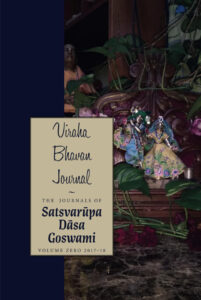
Viraha Bhavan Journal (2017–2018) was written by Satsvarūpa Mahārāja following a brief hiatus in writing activity, and was originally intended to be volume 1 in a series of published journals. However, following its completion and publication, Mahārāja again stopped writing books, subsequently focusing only on what became his current online journal, which began in August of 2018.
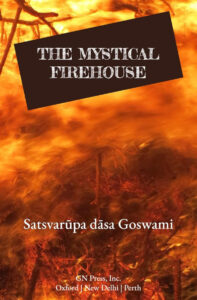
At first, I took it hard that I would have to live surrounded by the firemen, and without my own solitude. After all, for decades I had lived in my own house with my own books and my own friends. I was also now a crippled person who couldn’t walk, living among men who did active duties. But when Baladeva explained it to me, how it was not so bad living continually with other firemen and living in the firehouse with its limited facilities, I came to partially accept it and to accept the other men. I came to accept my new situation. I would live continually in the firehouse and mostly not go outside. I would not lead such a solitary life but associate with the other firemen.
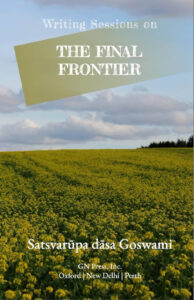
Let me write sweet prose.
Let me write not for my own benefit
but for the pleasure of Their Lordships.
Let me please Kṛṣṇa,
that’s my only wish.
May Kṛṣṇa be pleased with me,
that’s my only hope and desire.
May Kṛṣṇa give me His blessings:
Kṛṣṇa Kṛṣṇa Kṛṣṇa Kṛṣṇa Kṛṣṇa he
Rāma Rāghava Rāma Rāghava
Rāma Rāghava rakṣa mām.
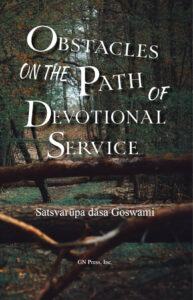
You mentioned that your pathway has become filled with stumbling blocks, but there are no stumbling blocks. I can kick out all those stumbling blocks immediately, provided you accept my guidance. With one stroke of my kick, I can kick out all stumbling blocks. —Letter by Śrīla Prabhupāda, December 9, 1972.
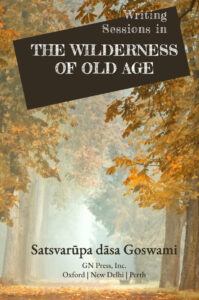
The Writing Sessions are my heart and soul. I’m trying my best to keep up with them. I am working with a few devotees, and they are far ahead of me. I wander in the wilderness of old age. I make my Writing Sessions as best I can. Every day I try to come up with a new subject. Today I am thinking of my parents. But I don’t think of them deeply. They are long gone from my life. Śrīla Prabhupāda wrote a poem when he was a sannyāsī, and he said now all my friends and relatives are gone. They are just a list of names now. I am like that too. I am a sannyāsī with a few friends. I love the books of Śrīla Prabhupāda. I try to keep up with them. I read as much as I can and then listen to his bhajanas.
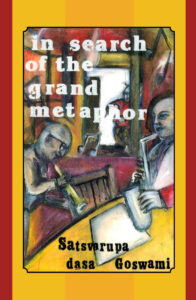
The metaphor is song. Explain it. Yes, particulars may not seem interesting or profound to readers who want structured books.
Wait a minute. Don’t pander to readers or concepts of Art. But Kṛṣṇa conscious criteria are important and must be followed. So, if your little splayed-out life-thoughts are all Kṛṣṇa conscious, then it’s no problem.
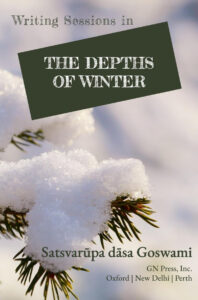
I am near the end of my days. But I do like the company of like-minded souls, especially those who are Kṛṣṇa conscious. Yes! I am prone to Kṛṣṇa consciousness. I have been a disciple of Bhaktivedanta Swami Prabhupāda for maybe almost sixty years. Sometimes I fail him. But I always bounce back and fall at his feet. It is a terrible thing that I sometimes do not have the highest love for him. It is a terrible thing. Actually, however, I never fall away from him. He always comes and catches me and brings me back to his loving arms.

This edition of Satsvarūpa dāsa Goswami’s 1996 timed book, Upstate: Room to Write, is published as part of a legacy project to restore Satsvarūpa Mahārāja’s writings to ‘in print’ status and make them globally available for current and future readers.
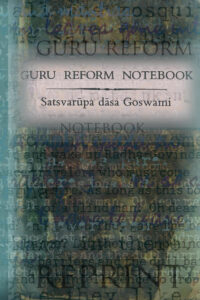
A factual record of the reform and change in ISKCON guru system of mid ’80s.
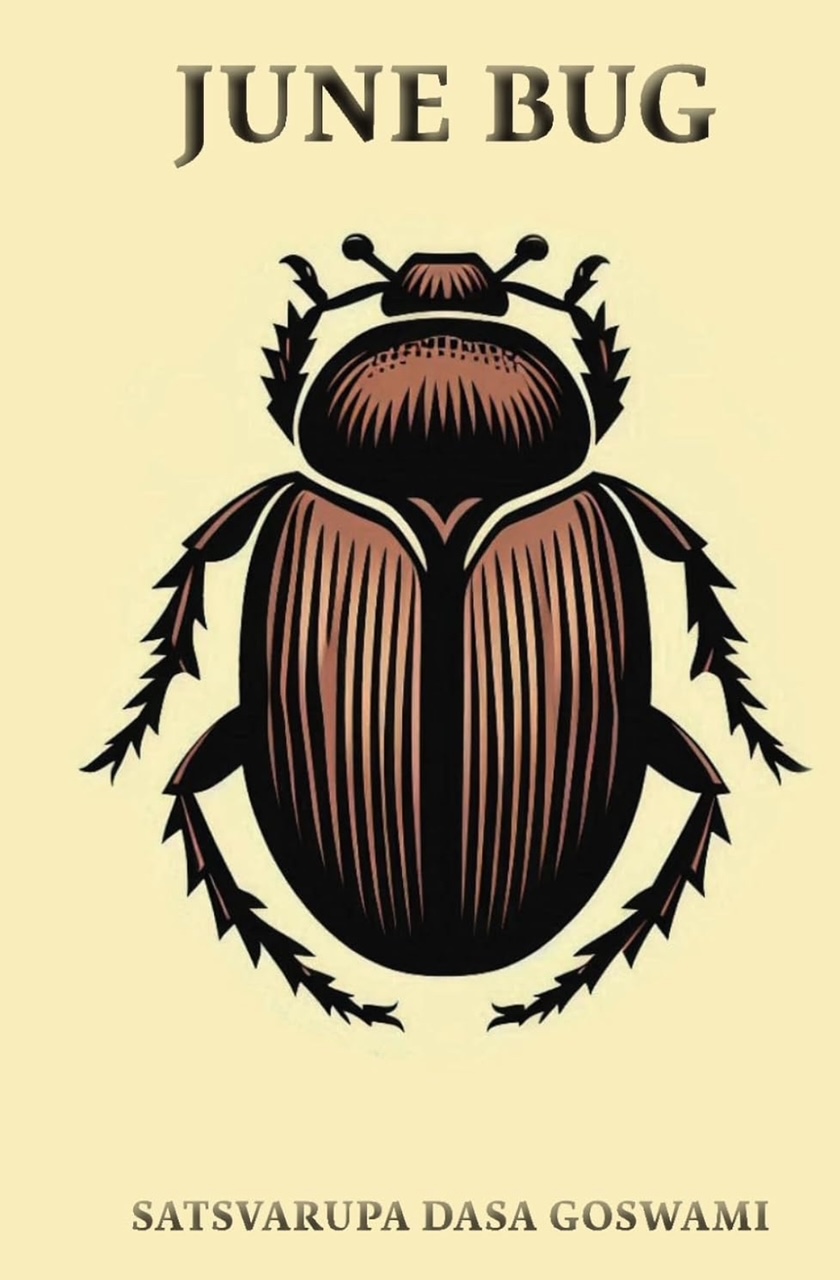
Readers will find, in the Appendix of this book, scans of a cover letter written by Satsvarūpa Mahārāja to the GN Press typist at the time, along with some of the original handwritten pages of June Bug. Together, these help to illustrate the process used by Mahārāja when writing his books during this period. These were timed books, in the sense that a distinct time period was allotted for the writing, during SDG’s travels as a visiting sannyāsī
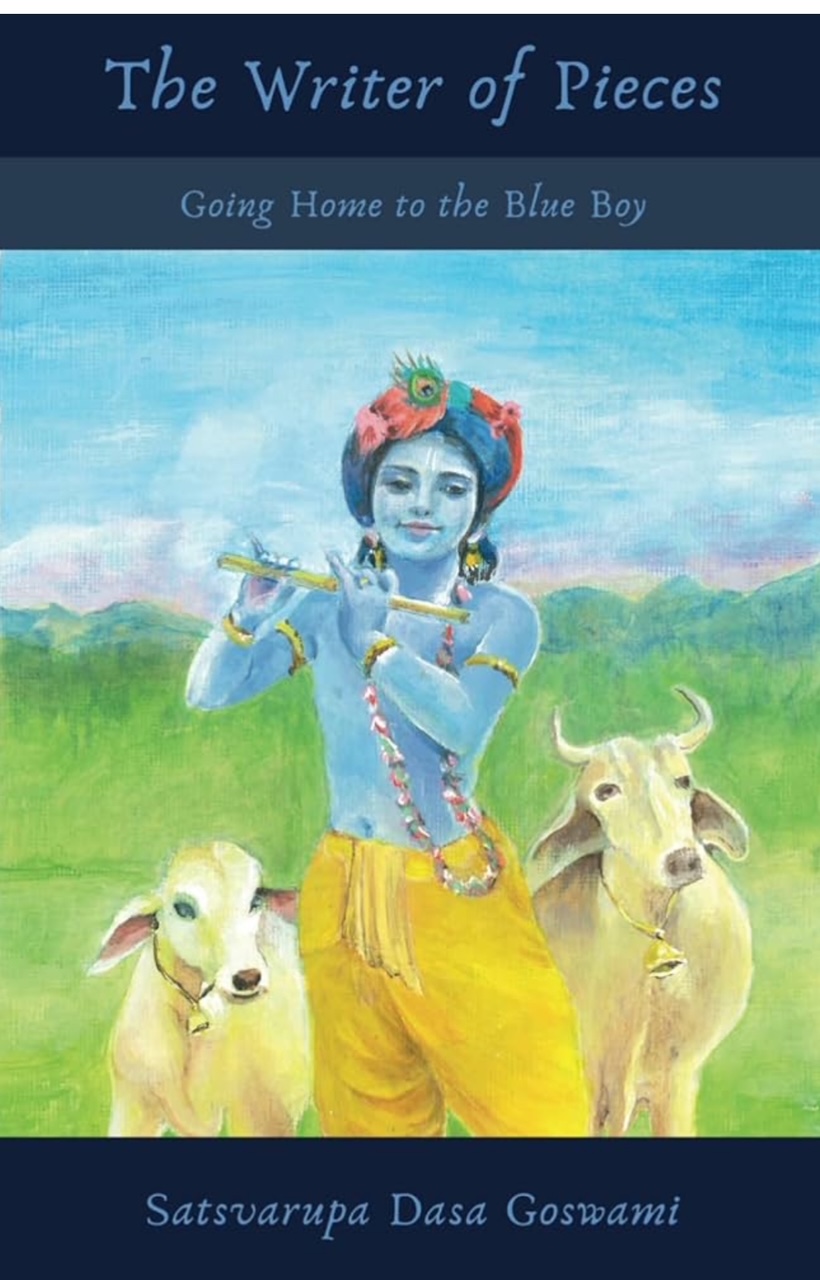
Don’t take my pieces away from me. I need them dearly. My pieces are my prayers to Kṛṣṇa. He wants me to have them, this is my way to love Him. Never take my pieces away.
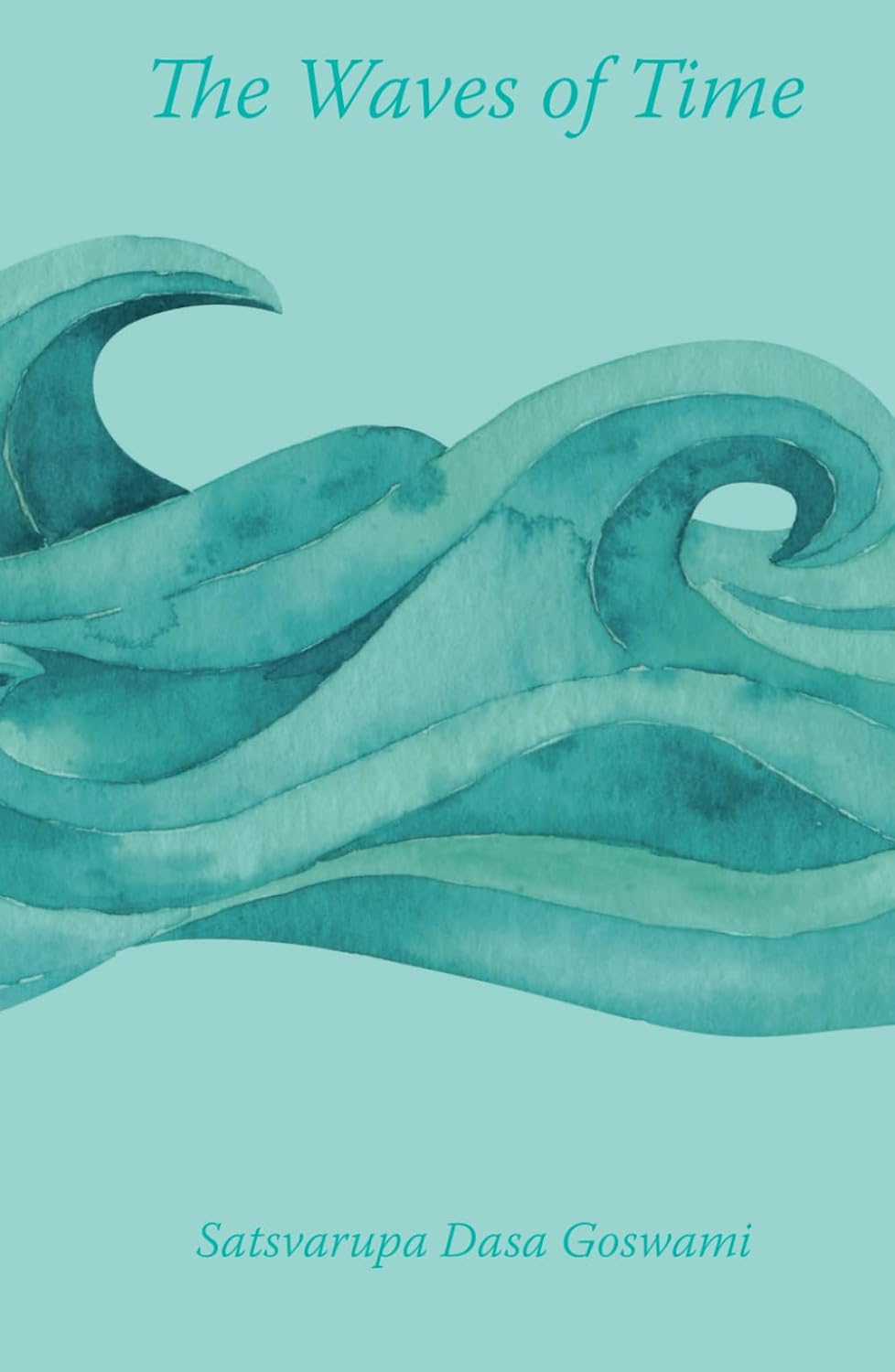
Many planks and sticks, unable to stay together, are carried away by the force of a river’s waves. Similarly, although we are intimately related with friends and family members, we are unable to stay together because of our varied past deeds and the waves of time.

To Śrīla Prabhupāda, who encouraged his devotees (including me) To write articles and books about Kṛṣṇa Consciousness.
I wrote him personally and asked if it was alright for his disciples to write books, Since he, our spiritual master, was already doing that. He wrote back and said that it was certainly alright For us to produce books.

I have a personal story to tell. It is a about a time (January–July 1974) I spent as a personal servant and secretary of my spiritual master, His Divine Grace A.C. Bhaktivedanta Swami Prabhupäda, founder-äcärya of the International Society for Krishna Consciousness. Although I have written extensively about Çréla Prabhupäda, I’ve hesitated to give this account, for fear it would expose me as a poor disciple. But now I’m going ahead, confident that the truth will purify both my readers and myself.

First published by The Gītā-nāgarī Press/GN Press in serialized form in the magazine Among Friends between 1996 and 2001, Best Use of a Bad Bargain is collected here for the first time in this new edition. This volume also contains essays written by Satsvarūpa dāsa Goswami for the occasional periodical, Hope This Meets You in Good Health, between 1994 and 2002, published by the ISKCON Health and Welfare Ministry.

This book has two purposes: to arouse our transcendental feelings of separation from a great personality, Śrīla Prabhupāda, and to encourage all sincere seekers of the Absolute Truth to go forward like an army under the banner of His Divine Grace A.C. Bhaktivedanta Swami Prabhupāda and the Kṛṣṇa consciousness movement.

A single volume collection of the Nimai novels.

Śrīla Prabhupāda was in the disciplic succession from the Brahmā-Mādhva-Gauḍīya sampradāya, the Vaiṣṇavas who advocate pure devotion to God and who understand Kṛṣṇa as the Supreme Personality of Godhead. He always described himself as simply a messenger who carried the paramparā teachings of his spiritual master and Lord Kṛṣṇa.

Dear Srila Prabhupada,
Please accept this or it’s worse than useless.
You have given me spiritual life
and so my time is yours.
You want me to be happy in Krishna consciousness
You want me to spread Krishna consciousness,

This collection of Satsvarūpa dāsa Goswami’s writings is comprised of essays that were originally published in Back to Godhead magazine between 1966 and 1978, and compiled in 1979 by Gita Nagari Press as the volume A Handbook for Kṛṣṇa Consciousness.

This second volume of Satsvarūpa dāsa Goswami’s Back to Godhead essays encompasses the last 11 years of his 20-year tenure as Editor-in-Chief of Back to Godhead magazine. The essays in this book consist mostly of SDG’s ‘Notes from the Editor’ column, which was typically featured towards the end of each issue starting in 1978 and running until Mahārāja retired from his duties as editor in 1989.

This collection of Satsvarupa dasa Goswami’s writings is comprised of essays that were originally published in Back to Godhead magazine between 1991 and 2002, picking up where Volume 2 leaves off. The volume is supplemented by essays about devotional service from issues of Satsvarupa dasa Goswami’s magazine, Among Friends, published in the 1990s.

“This is a different kind of book, written in my old age, observing Kṛṣṇa consciousness and assessing myself. I believe it fits under the category of ‘Literature in pursuance of the Vedic version.’ It is autobiography, from a Western-raised man, who has been transformed into a devotee of Kṛṣṇa by Śrīla Prabhupāda.”
 The Best I Could Do
The Best I Could DoI want to study this evolution of my art, my writing. I want to see what changed from the book In Search of the Grand Metaphor to the next book, The Last Days of the Year.
 a Hare Krishna Man
a Hare Krishna ManIt’s world enlightenment day
And devotees are giving out books
By milk of kindness, read one page
And your life can become perfect.
 Calling Out to Srila Prabhupada: Poems and Prayers
Calling Out to Srila Prabhupada: Poems and PrayersO Prabhupāda, whose purports are wonderfully clear, having been gathered from what was taught by the previous ācāryas and made all new; O Prabhupāda, who is always sober to expose the material illusion and blissful in knowledge of Kṛṣṇa, may we carefully read your Bhaktivedanta purports.

I use free-writing in my devotional service as part of my sādhana. It is a way for me to enter those realms of myself where only honesty matters; free-writing enables me to reach deeper levels of realization by my repeated attempt to “tell the truth quickly.” Free-writing takes me past polished prose. It takes me past literary effect. It takes me past the need to present something and allows me to just get down and say it. From the viewpoint of a writer, this dropping of all pretense is desirable.
 Geaglum Free Write
Geaglum Free WriteThis edition of Satsvarūpa dāsa Goswami’s 1996 timed book, Geaglum Free Write Diary, is published as part of a legacy project to restore Satsvarūpa Mahārāja’s writings to ‘in print’ status and make them globally available for current and future readers.